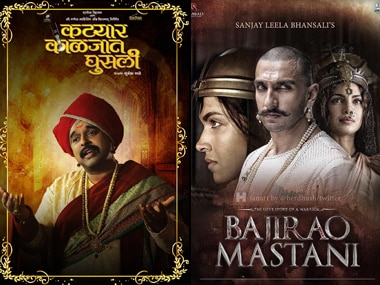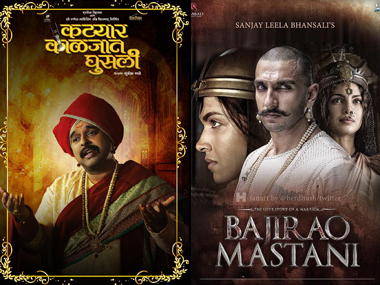There was a time when almost every other film song was based on some raga or the other. Entire films based on the classical Hindustan heritage, such as Baiju Bawra, Abhimaan and Sur Sangam were made. The Hindustani classical heritage evaporated in this millennium. After A R Rahman, Indian film music has moved resolutely away from its traditional roots. To see the musical heritage make a sudden and unexpected comeback in 2015 was one of the residual pleasures of the ‘ear’, and one for which the credit must go to two filmmakers Sanjay Leela Bhansali and Subodh Bhave. In Bhansali’s Bajirao Mastani we get to not just hear a spectrum of sounds culled from the classical tradition we also get to ‘see’ those sounds as they acquire a visual manifestation through the director’s lucid vision. The way Bhansali makes use of various Hindustani classical choruses in each composition cannot be appreciated fully while viewing the film, or even partly on the internet where the entire soundtrack was released. [caption id=“attachment_2566708” align=“alignleft” width=“380”]  Movie posters of Katyar Kaljat Ghusli and Bajirao Mastani.[/caption] In fact for the film’s producers to release Bhansali’s songs and music on the internet showed the leaning towards philistinism in music and the other arts . This is where actor Subodh Bhave’s Marathi movie Katyar Kaljat Ghusali comes into play as an effective instrument of change whereby the flourishing annihilation of indigenous sounds in our cinema is stunned and reversed. To hear Shankar Mahadevan give soul to a theme of combative jugalbandi between two classical maestros in a royal durbar, is to be transported to a world of unhampered tonal ripeness plucked from the strings of the tanpura, sitar and sarangi and transported to a contemporary audience with fearless sincerity and passion. Mahadevan is an astoundingly versatile singer-musician. He began learning Hindustani and Carnatic sangeet from the age of 5. As he grew older his musical horizons expanded to all sort of musical experiences from across the world. Katyar Kaljat Ghusli which also marks Shankar’s acting debut follows the craggy, moral and musical path of two musicians, played by Mahadevan and Sachin Pilgaonkar who returns to the screen after quite a while. These two were chosen for the main parts because of their association with music. Though an actor, Sachin sings well and knows his sangeet. Katyar Kaljat Ghusli is a film adaptation of a renowned and popular Marathi play from the 1960s. Director Subodh Bhave who appears mid-way in a pivotal role , has ensured that the flavor of the original material , the theme of gaayaki and mausiqui being contaminated by cut-throat competitivesness, is not lost in the celluloid grandeur that Bhave conjures on sets that Bhansali could have built for Bajirao Mastani if the budget was lowered. The trick of doing the pure Hindustani classical score in Katyar Kaljat Ghusli was to ensure that the sur and mood of the original is not lost. Some of the original music from the play by Jitendra Abhisheki is retained by Mahadevan. Also remarkable is the use of the spoken language in the film. While Shankar Mahadevan who plays Pandit Bhanu Shankar Shastri speaks in Marathi, Sachin Pilgaonkar who plays Khan Saheb speaks in Urdu. Meanwhile, the fusion of the two cultures Hindu and Islamic, is also central to Bajirao Mastani. Interestingly Prakash Kapadia, who has written the dialogues for Bajirao Mastani, has done the screenplay for Katyar Kaljat Ghusli. Speaking on his challenge to create a fresh classical soundtrack for the film while retaining the musical flavour of the original play Mahadevan says, “At first I was really scared as I did not want to tamper with the sanctity of Abhisheki bua (original composer Jitendra Abhisheki’s music) as it is in the DNA of every Maharashtrian. But here was an opportunity to compose more Bandishs, Qawali, bhajan, semi classical stuff which tempted me and also a chance to exploit my musical education for the last 30 years. So I risked it." For two films bringing back the era of the classical aura into Indian cinema, to be released within the same year is a huge achievement. And one that must be applauded wholeheartedly. Or with a khula galaa (open throat) , as they say among classical vocalists.
In Bhansali’s Bajirao Mastani we get to not just hear a spectrum of sounds culled from the classical tradition we also get to ‘see’ those sounds
Advertisement
End of Article
Written by Subhash K Jha
Subhash K Jha is a Patna-based journalist. He's been writing about Bollywood for long enough to know the industry inside out. see more


)
)
)
)
)
)
)
)
)



